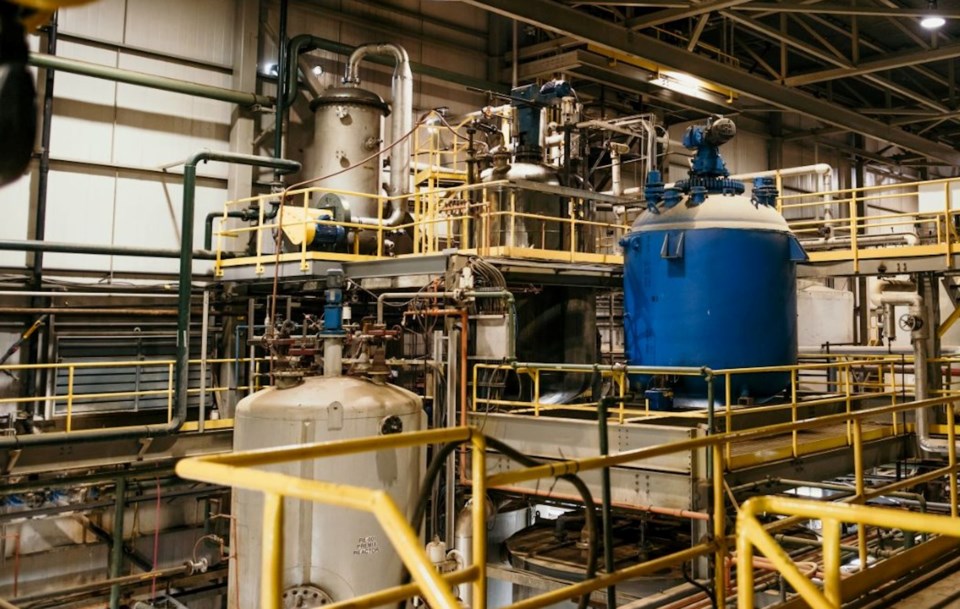The first shipment of ‘black mass’ battery material arrives next week for testing at a Temiskaming refinery.
Electra Battery Materials is ready to throw the switch on its $3-million recycling demonstration plant, one of the exciting initiatives the Toronto company has underway in bringing the former Yukon refinery back to life.
Electra is seeking to establish a one-of-a-kind battery materials industry park, located between the town of Cobalt and Temiskaming Shores. Recycling material from spent batteries will be one component of the proposed $800-million complex.
“Overall, I think this is going to be a real winner for the company,” said Mark Trevisiol, Electra’s vice-president of project development, in a Nov. 10 webcall with analysts, highlighting the company’s third-quarter financial results.
The company posted a quarterly net loss of $7.6 million but holds a cash balance of $19.7 million — including some government funding — to execute on the refinery project and their various testing and technical studies.
The highlight of the quarter was Electra signing a three-year cobalt supply agreement with South Korea’s LG Energy Solution, the world’s second largest electric vehicle battery manufacturer.
Their targeted customers are North American automakers in seeking to provide them with all the processed metals needed for the batteries used in electric vehicles.
On the recycling end, company CEO Trent Mell hopes to secure supply agreements with 20 to 30 potential black mass providers, companies that basically shred all types of batteries into a powdery material that’ll be shipped to Temiskaming.
Electra’s proprietary recycling technology will recover the all valuable material coveted by battery manufacturers.
Mell said they envision a future downstream market where all their recycling business will be tied into feeding one of two battery cell companies.
Battery recycling is a relatively new industry, but one that’s going in “one direction in being able to recycle these metals,” said Trevisiol. Many companies are “knocking on our door to obtain them.”
The company said it won’t be releasing any results on the metal recoveries from the recycling, their focus being on perfecting the process up to industry acceptable standards.
Mell and Trevisiol said they’re largely pleased with the results from bench-scale testing and the recoveries of cobalt, nickel, lithium and graphite.
Electra’s biggest upcoming milestone occurs next spring for the start of commissioning of the cobalt refinery. The cash flow from sales of cobalt sulfate should start coming in by next summer.
The timing of the commissioning coincides with some favourable U.S. legislation and government stimulus spending, combined with a growth opportunity in Quebec.
In the webcall, Mell stressed the importance of what the U.S. Inflation Reduction Act (IRA) means to Electra and its place in the ‘onshoring’ movement to domestically source all of the critical metals needed in the North American electric vehicle sector.
The IRA will inject billions into the American economy and those companies with clean energy technologies and hold sources of so-called green metals.
It’s beneficial to critical metals mining companies from countries with free trade deals with the U.S. and process metals outside of China, where 80 per cent of world’s cathode refining takes place.
Policy-wise, Mell said the Biden administration wants more domestic production of critical minerals but hasn’t provided any specifics on how they'll provide companies with assistance on mineral exploration, technical studies and on the extractive side. Yet, there’s plenty of funding available to build a mill or refinery.
In the big picture, Mell said the IRA stands to be a huge investor drawing card for Electra, which holds an cobalt exploration property in Idaho and is a budding refiner at the first step in the chemical conversion process in making battery-ready material.
“I see that as a huge tail wind for all of our initiatives that we’re chasing,” said Mell.
But until Electra gets its Idaho cobalt project into production, Mell said his company will importing all of its cobalt hydroxide from the Democratic Republic of Congo (DRC) for the time being. The first shipments arrive in Temiskaming next spring, coinciding with the refinery commissioning.
“As we move to onshore the supply chain into North America, finding cobalt is really hard and the DRC is going to remain, for years to come, a huge source of cobalt.”
Electra’s geology team was in the African country this week taking a tour of Glencore’s mines there, mining company that Electra is looking to buy responsibly sourced cobalt from.
Another iron in the fire is Electra is contemplating building a second cobalt refinery in Becancour, Que. — dubbed “Battery Valley” — where they were asked by the Quebec government there to be the cobalt producer in an emerging industrial park. Electra is running a prefeasibility study on whether to join the club out there.
The company said interest from potential customers continues to intensify and they expect to finalize some agreements by year’s end to be 100 per cent sold. Mell said it would support an expansion of the Temiskaming refinery — “which we are envisioning” — or an expansion into Becancour where they are seeing “tremendous” support from the federal and provincial government.


